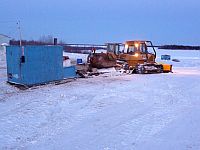 The Kasabonika Lake First Nation, a remote fly-in community 500 kilometres north of Thunder Bay, isn't sitting back and waiting for mining and exploration companies to come knocking. Convinced that mining is the their best hope for economic prosperity, community leaders are laying out the red carpet and doing some door knocking themselves on Bay Street, Toronto's financial centre.
The Kasabonika Lake First Nation, a remote fly-in community 500 kilometres north of Thunder Bay, isn't sitting back and waiting for mining and exploration companies to come knocking. Convinced that mining is the their best hope for economic prosperity, community leaders are laying out the red carpet and doing some door knocking themselves on Bay Street, Toronto's financial centre.
The community of 1,000 people established the Kasabonika Mineral Services Corporation three years ago to offer mining companies staking, prospecting, linecutting and other exploration services. It boasts an airstrip and can supply accommodations, groceries and fuel, but what community leaders really want is a piece of the action.
"We have staked our own claims, flown airborne surveys and have gathered proprietary information that can be used to leverage joint venture agreements with exploration companies," said Kasabonika Lake minerals co-ordinator Antonius Knijnenburg.
The community's first exposure to the mining industry occurred 10 years ago when Kennecott Minerals did some exploration work in the area.
Goldcorp JV
"Since then, we've gone from not knowing anything about mining to signing a joint venture with Goldcorp," said Knijnenburg.Deputy chief Eno H. Anderson deserves much of the credit for encouraging the community to take an interest in the mining industry, he said.
"He saw it right from the start as a new economic activity that could make a big difference. Forestry is not an option because the trees don't grow fast enough, tourism doesn't employ many people and there's not a whole lot else."
A new mine with 400 jobs would be a game-changer for Kasabonika Lake.
"We sat down with our resource development planning board and they said ‘This is all nice with companies coming to town and us getting some work out of it, but this is historically our area. We've used the resources to survive, so can you guys negotiate an ownership interest?'
"We looked at each other and said, ‘We don't know what we can bring to the table. This might be a tough sell.' Then we started talking with companies - Goldcorp in particular - and they weren't taken aback. They said, ‘Maybe this is something we can do.'"
Kasabonika Lake is proactively making contact with exploration companies and offering staked claims, geophysical information, drillhole data and assays on rock samples collected by the community's own prospectors.
Notification package
It offers mining companies a notification package and a predictable set of guidelines for exploration activity in its traditional territory."Often, companies don't know what they're getting into, so we tell them what we want to know. We invite them to sit down and talk to us about what they plan to do in our area and how we can work together," said Knijnenburg.
The community adheres to four basic principles: respect for its culture, protection of the environment, compliance with its treaty and Aboriginal rights and a requirement that the community-at-large must benefit from resource development.
"If we have a company that comes to us and says ‘We staked a couple claims and we want to drill some holes two weeks from now, that's the wrong way to start," said Knijnenburg.
"Come and talk to us. Tell us what you'd like to do. We appreciate that you're on a tight schedule but, at the same time, we'd like to do things in a way where we work together. We're always pushing for a joint venture approach.
"Don't give us beads and mirrors. Give us some actual ownership interest. A cheque for $10,000 or $15,000 up front doesn't mean anything. How about 25 or 30 per cent ownership right through to putting together a feasibility study? Then we can find some money to participate in the mine as well. Make us a partner. Bring us onboard.
"We would like to be part of the decision-making process in carrying out exploration programs," he added. "We want to learn and build capacity in our community instead of being on the outside looking in."

